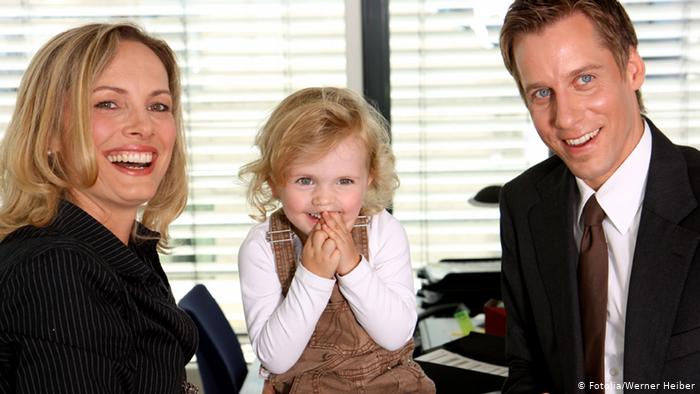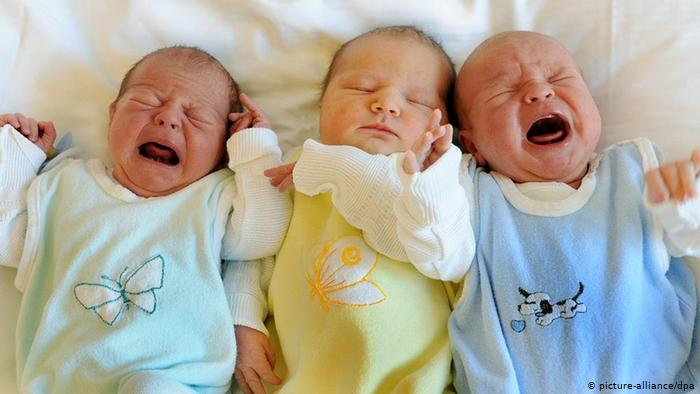Most parents in Germany still think in old models: the man works, the woman looks after the children. Only the east is different, as a new Allensbach study shows.

Why only do Germans have so few children – in a country that is doing so well economically? Politicians have been worrying about this for years and are trying to counteract this with a variety of measures: for example, parents receive money from the state for each child and daycare facilities are being expanded. Still, birth rates are falling. What remains are terrifying statistics. These state that the Germans are getting older and older. This has consequences that politicians fear.
There is less labor for the economy and higher costs for the social systems. "We make it too complicated", said Renate Köcher from the Institute for Demoscopy in Allensbach when presenting a new family policy study in Berlin. "There is still black and white thinking: child or career". The result of this thinking is that there are plenty of childless women. Other countries would deal with having children more easily. Evidence can be found, for example, in France.
Federal Family Minister Manuela Schwesig (SPD) sums up the dilemma of many women in Germany: "No matter how you do it, you always do it wrong. If you miss a meeting in the office because you want to daughter want, you have a guilty conscience – and vice versa."
How can you change that? The Ministry of Family has commissioned a study together with Professor Köcher’s institute in Allensbach given. The following questions were examined: "How do young parents share family and work ?" – and "How is this decision making going??"
Big differences in East and West Germany
The representative survey of 3,000 couples with children under the age of six showed that 87 percent of fathers and mothers quickly agreed on the future division of labor before the birth of the first child. But the quick peace at the kitchen table has consequences. Especially in the west of the republic it looks like that "Mothers fall into the part-time trap and fathers into the full-time trap", said the minister.
In contrast, a different model works in the east, explains social researcher Renate Köcher. In eastern Germany, a majority strive for the employment of both parents and live this model. Parents in the East would think like parents in France or Sweden, Köcher explained. But things have also started to move in the West since Germany – East and West – reunited after the fall of the Berlin Wall.
Many mothers are back at work
"The picture of the raven mother has to go", demanded SPD minister Schwesig, who grew up in East Germany (in the GDR). It must be over that conservative politicians make mothers feel guilty if they don’t care for their offspring full-time.

Minister of Family Schwesig: "The picture of the raven mother must be over!"
It should be noted, Renate Köcher from the Allensbach Institute emphasized that there was no such east-west difference in the way parents thought before the birth of their child. The interviews showed that as of time Before the birth in both parts of Germany, more than 90 percent of all parents rate professional self-fulfillment as very important personally. But then the women came back – especially in the west. Full-time employment is then rather the exception. 17 percent of women even quit working life entirely. However, every second person actually wants to go back to work, but is rarely supported by this father. "There remains a subliminal feeling that it should actually be done differently", summarized quiver.
A gap between desire and reality
In addition to models in the minds of parents, money also plays an important role, says the social researcher Köcher. There is a considerable tax advantage in Germany if one partner earns far less than the other. In tax law this is called legal "Ehegattensplitting". The decisive factor for young families is still the often lack of childcare. The question for many parents is: is there a place in kindergarten or not? There are still gaps in the West, Family Minister Manuela Schwesig has to admit.
Overall, the study shows that there is a large gap between desire and reality. When asked what young families wanted from family policy, 69 percent of both parents replied that they want a better work-life balance. 62 percent would like to work full-time.
Schwesig and Köcher appealed to the young families to consider the long-term consequences of their division of labor. Women who only work part-time then naturally receive a lower pension. Throughout society, the wage gap between women and men remains 22 percent.
RELATED ITEMS
-

Germany birth rate: Child shortage is becoming a problem for Germany
Germany’s birth rate Child deficiency is becoming a problem for Germany Nowhere else in the world do people have fewer children than in Germany….
-

More poor children in rich Germany, Germany, dw
Not only the economy in Germany is growing. Child poverty is also increasing. This emerges from a new study. This is also to blame…
-

Study: children are at risk of poverty in Germany, currently Germany, dw
Bochum researchers calculate a significantly higher risk of poverty for single parents and families than in previous studies. The basis is a new method,…
-

Birth rate in Germany is increasing again – naturopathy – naturopathic specialist portal
This text corresponds to the specifications of the medical literature, medical guidelines and current studies and was developed by medical professionals…
